5N1279 Assignment 2: Analyzing Joan's Healthcare Needs and Support
VerifiedAdded on 2023/04/23
|13
|3720
|159
Case Study
AI Summary
This case study examines Joan, a 55-year-old widow, exploring her physical, mental, and social needs following the sudden death of her husband. The assignment delves into the impact of her husband's death, her children's varying levels of support, and her increased alcohol consumption, identifying her needs for assisted living, mental health counseling, and social support. It discusses the application of developmental theories like Hayflick limit, Piaget's stages, and Erikson's psychosocial stages to understand Joan's situation. The analysis evaluates the strategies and services available, including HSE home support and community healthcare, while also acknowledging unmet needs stemming from family dynamics and isolation. The assignment concludes with recommendations for a comprehensive approach to support Joan's well-being and address her immediate and long-term needs, emphasizing the role of healthcare professionals, family, and community resources. The assignment also covers the interpersonal skills needed to provide care to Joan.
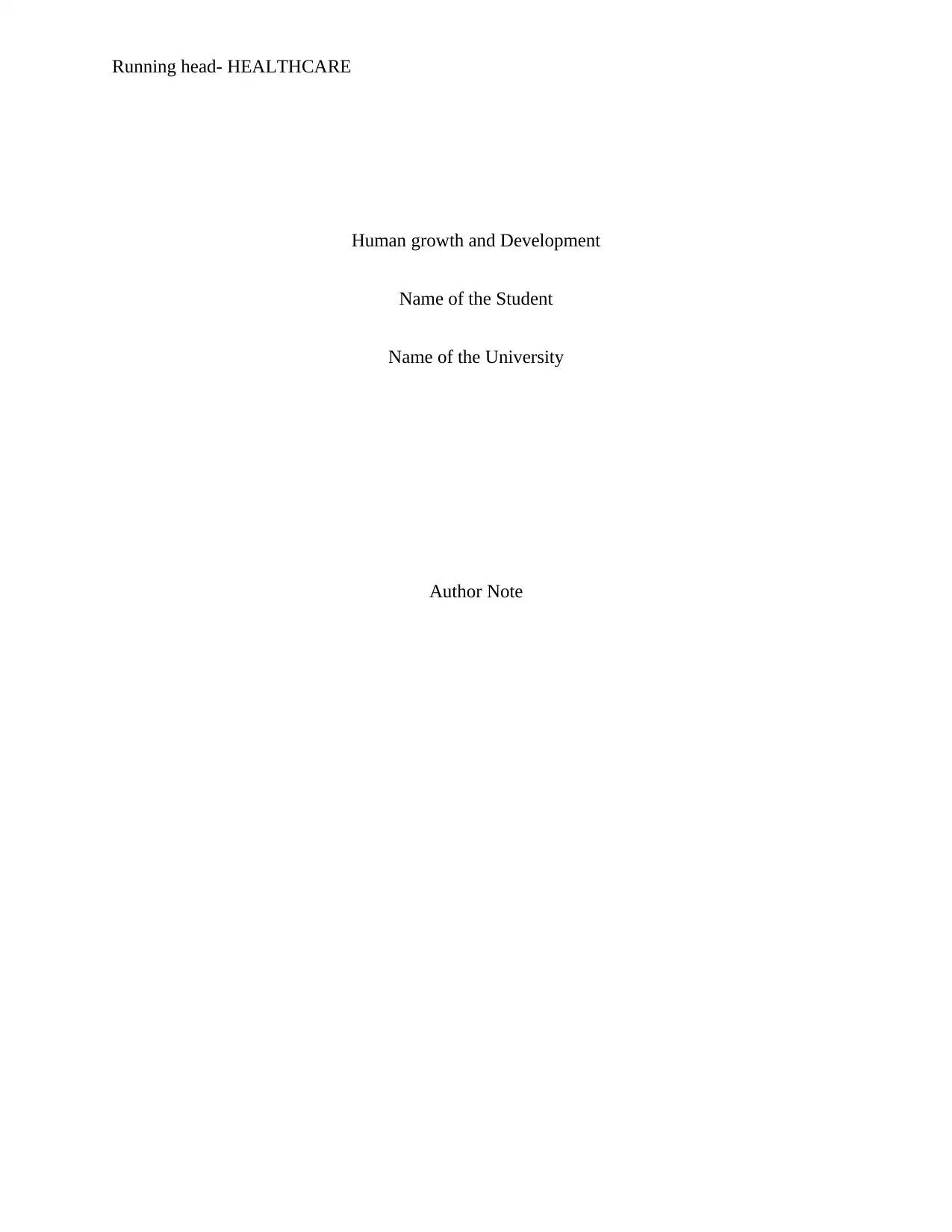
Running head- HEALTHCARE
Human growth and Development
Name of the Student
Name of the University
Author Note
Human growth and Development
Name of the Student
Name of the University
Author Note
Paraphrase This Document
Need a fresh take? Get an instant paraphrase of this document with our AI Paraphraser
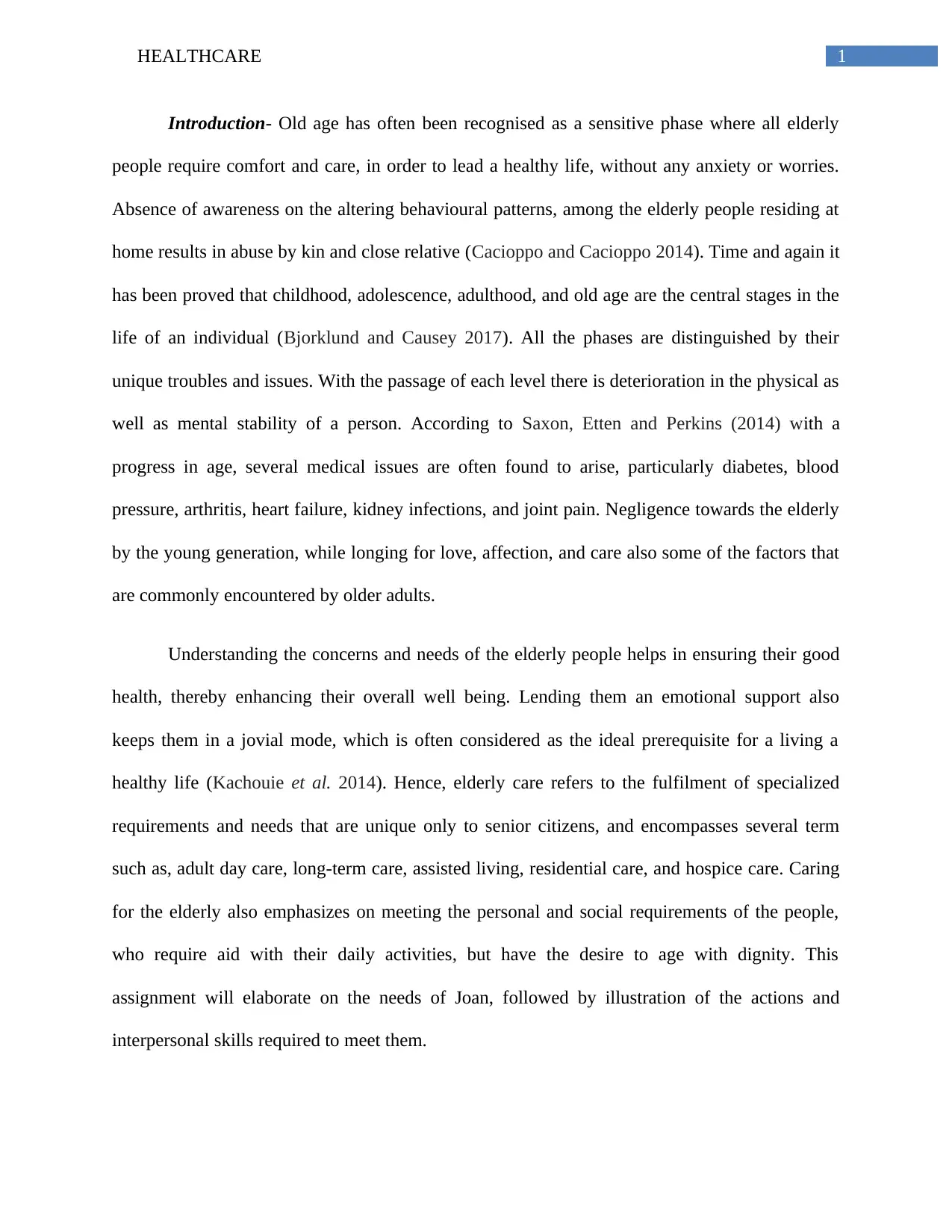
1HEALTHCARE
Introduction- Old age has often been recognised as a sensitive phase where all elderly
people require comfort and care, in order to lead a healthy life, without any anxiety or worries.
Absence of awareness on the altering behavioural patterns, among the elderly people residing at
home results in abuse by kin and close relative (Cacioppo and Cacioppo 2014). Time and again it
has been proved that childhood, adolescence, adulthood, and old age are the central stages in the
life of an individual (Bjorklund and Causey 2017). All the phases are distinguished by their
unique troubles and issues. With the passage of each level there is deterioration in the physical as
well as mental stability of a person. According to Saxon, Etten and Perkins (2014) with a
progress in age, several medical issues are often found to arise, particularly diabetes, blood
pressure, arthritis, heart failure, kidney infections, and joint pain. Negligence towards the elderly
by the young generation, while longing for love, affection, and care also some of the factors that
are commonly encountered by older adults.
Understanding the concerns and needs of the elderly people helps in ensuring their good
health, thereby enhancing their overall well being. Lending them an emotional support also
keeps them in a jovial mode, which is often considered as the ideal prerequisite for a living a
healthy life (Kachouie et al. 2014). Hence, elderly care refers to the fulfilment of specialized
requirements and needs that are unique only to senior citizens, and encompasses several term
such as, adult day care, long-term care, assisted living, residential care, and hospice care. Caring
for the elderly also emphasizes on meeting the personal and social requirements of the people,
who require aid with their daily activities, but have the desire to age with dignity. This
assignment will elaborate on the needs of Joan, followed by illustration of the actions and
interpersonal skills required to meet them.
Introduction- Old age has often been recognised as a sensitive phase where all elderly
people require comfort and care, in order to lead a healthy life, without any anxiety or worries.
Absence of awareness on the altering behavioural patterns, among the elderly people residing at
home results in abuse by kin and close relative (Cacioppo and Cacioppo 2014). Time and again it
has been proved that childhood, adolescence, adulthood, and old age are the central stages in the
life of an individual (Bjorklund and Causey 2017). All the phases are distinguished by their
unique troubles and issues. With the passage of each level there is deterioration in the physical as
well as mental stability of a person. According to Saxon, Etten and Perkins (2014) with a
progress in age, several medical issues are often found to arise, particularly diabetes, blood
pressure, arthritis, heart failure, kidney infections, and joint pain. Negligence towards the elderly
by the young generation, while longing for love, affection, and care also some of the factors that
are commonly encountered by older adults.
Understanding the concerns and needs of the elderly people helps in ensuring their good
health, thereby enhancing their overall well being. Lending them an emotional support also
keeps them in a jovial mode, which is often considered as the ideal prerequisite for a living a
healthy life (Kachouie et al. 2014). Hence, elderly care refers to the fulfilment of specialized
requirements and needs that are unique only to senior citizens, and encompasses several term
such as, adult day care, long-term care, assisted living, residential care, and hospice care. Caring
for the elderly also emphasizes on meeting the personal and social requirements of the people,
who require aid with their daily activities, but have the desire to age with dignity. This
assignment will elaborate on the needs of Joan, followed by illustration of the actions and
interpersonal skills required to meet them.
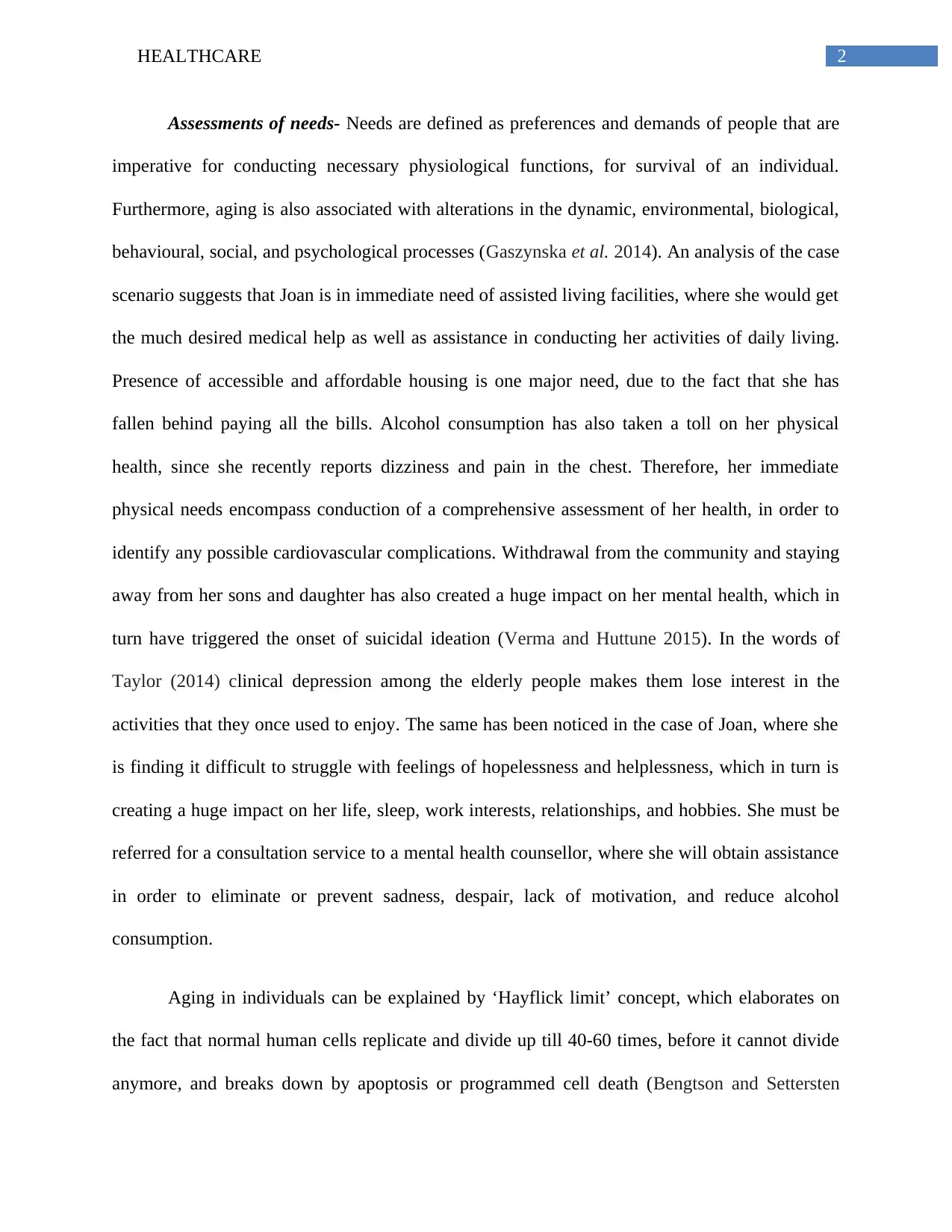
2HEALTHCARE
Assessments of needs- Needs are defined as preferences and demands of people that are
imperative for conducting necessary physiological functions, for survival of an individual.
Furthermore, aging is also associated with alterations in the dynamic, environmental, biological,
behavioural, social, and psychological processes (Gaszynska et al. 2014). An analysis of the case
scenario suggests that Joan is in immediate need of assisted living facilities, where she would get
the much desired medical help as well as assistance in conducting her activities of daily living.
Presence of accessible and affordable housing is one major need, due to the fact that she has
fallen behind paying all the bills. Alcohol consumption has also taken a toll on her physical
health, since she recently reports dizziness and pain in the chest. Therefore, her immediate
physical needs encompass conduction of a comprehensive assessment of her health, in order to
identify any possible cardiovascular complications. Withdrawal from the community and staying
away from her sons and daughter has also created a huge impact on her mental health, which in
turn have triggered the onset of suicidal ideation (Verma and Huttune 2015). In the words of
Taylor (2014) clinical depression among the elderly people makes them lose interest in the
activities that they once used to enjoy. The same has been noticed in the case of Joan, where she
is finding it difficult to struggle with feelings of hopelessness and helplessness, which in turn is
creating a huge impact on her life, sleep, work interests, relationships, and hobbies. She must be
referred for a consultation service to a mental health counsellor, where she will obtain assistance
in order to eliminate or prevent sadness, despair, lack of motivation, and reduce alcohol
consumption.
Aging in individuals can be explained by ‘Hayflick limit’ concept, which elaborates on
the fact that normal human cells replicate and divide up till 40-60 times, before it cannot divide
anymore, and breaks down by apoptosis or programmed cell death (Bengtson and Settersten
Assessments of needs- Needs are defined as preferences and demands of people that are
imperative for conducting necessary physiological functions, for survival of an individual.
Furthermore, aging is also associated with alterations in the dynamic, environmental, biological,
behavioural, social, and psychological processes (Gaszynska et al. 2014). An analysis of the case
scenario suggests that Joan is in immediate need of assisted living facilities, where she would get
the much desired medical help as well as assistance in conducting her activities of daily living.
Presence of accessible and affordable housing is one major need, due to the fact that she has
fallen behind paying all the bills. Alcohol consumption has also taken a toll on her physical
health, since she recently reports dizziness and pain in the chest. Therefore, her immediate
physical needs encompass conduction of a comprehensive assessment of her health, in order to
identify any possible cardiovascular complications. Withdrawal from the community and staying
away from her sons and daughter has also created a huge impact on her mental health, which in
turn have triggered the onset of suicidal ideation (Verma and Huttune 2015). In the words of
Taylor (2014) clinical depression among the elderly people makes them lose interest in the
activities that they once used to enjoy. The same has been noticed in the case of Joan, where she
is finding it difficult to struggle with feelings of hopelessness and helplessness, which in turn is
creating a huge impact on her life, sleep, work interests, relationships, and hobbies. She must be
referred for a consultation service to a mental health counsellor, where she will obtain assistance
in order to eliminate or prevent sadness, despair, lack of motivation, and reduce alcohol
consumption.
Aging in individuals can be explained by ‘Hayflick limit’ concept, which elaborates on
the fact that normal human cells replicate and divide up till 40-60 times, before it cannot divide
anymore, and breaks down by apoptosis or programmed cell death (Bengtson and Settersten
⊘ This is a preview!⊘
Do you want full access?
Subscribe today to unlock all pages.

Trusted by 1+ million students worldwide
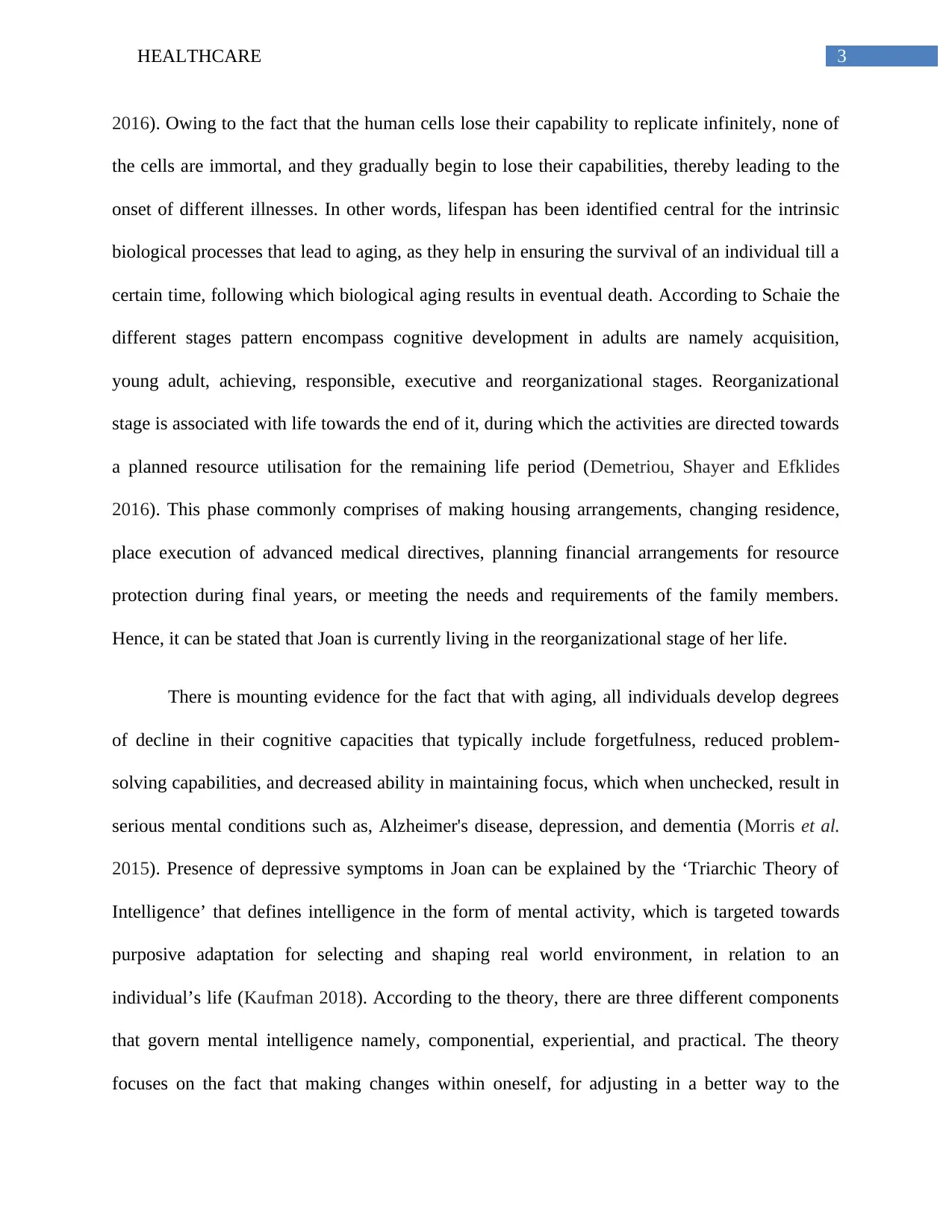
3HEALTHCARE
2016). Owing to the fact that the human cells lose their capability to replicate infinitely, none of
the cells are immortal, and they gradually begin to lose their capabilities, thereby leading to the
onset of different illnesses. In other words, lifespan has been identified central for the intrinsic
biological processes that lead to aging, as they help in ensuring the survival of an individual till a
certain time, following which biological aging results in eventual death. According to Schaie the
different stages pattern encompass cognitive development in adults are namely acquisition,
young adult, achieving, responsible, executive and reorganizational stages. Reorganizational
stage is associated with life towards the end of it, during which the activities are directed towards
a planned resource utilisation for the remaining life period (Demetriou, Shayer and Efklides
2016). This phase commonly comprises of making housing arrangements, changing residence,
place execution of advanced medical directives, planning financial arrangements for resource
protection during final years, or meeting the needs and requirements of the family members.
Hence, it can be stated that Joan is currently living in the reorganizational stage of her life.
There is mounting evidence for the fact that with aging, all individuals develop degrees
of decline in their cognitive capacities that typically include forgetfulness, reduced problem-
solving capabilities, and decreased ability in maintaining focus, which when unchecked, result in
serious mental conditions such as, Alzheimer's disease, depression, and dementia (Morris et al.
2015). Presence of depressive symptoms in Joan can be explained by the ‘Triarchic Theory of
Intelligence’ that defines intelligence in the form of mental activity, which is targeted towards
purposive adaptation for selecting and shaping real world environment, in relation to an
individual’s life (Kaufman 2018). According to the theory, there are three different components
that govern mental intelligence namely, componential, experiential, and practical. The theory
focuses on the fact that making changes within oneself, for adjusting in a better way to the
2016). Owing to the fact that the human cells lose their capability to replicate infinitely, none of
the cells are immortal, and they gradually begin to lose their capabilities, thereby leading to the
onset of different illnesses. In other words, lifespan has been identified central for the intrinsic
biological processes that lead to aging, as they help in ensuring the survival of an individual till a
certain time, following which biological aging results in eventual death. According to Schaie the
different stages pattern encompass cognitive development in adults are namely acquisition,
young adult, achieving, responsible, executive and reorganizational stages. Reorganizational
stage is associated with life towards the end of it, during which the activities are directed towards
a planned resource utilisation for the remaining life period (Demetriou, Shayer and Efklides
2016). This phase commonly comprises of making housing arrangements, changing residence,
place execution of advanced medical directives, planning financial arrangements for resource
protection during final years, or meeting the needs and requirements of the family members.
Hence, it can be stated that Joan is currently living in the reorganizational stage of her life.
There is mounting evidence for the fact that with aging, all individuals develop degrees
of decline in their cognitive capacities that typically include forgetfulness, reduced problem-
solving capabilities, and decreased ability in maintaining focus, which when unchecked, result in
serious mental conditions such as, Alzheimer's disease, depression, and dementia (Morris et al.
2015). Presence of depressive symptoms in Joan can be explained by the ‘Triarchic Theory of
Intelligence’ that defines intelligence in the form of mental activity, which is targeted towards
purposive adaptation for selecting and shaping real world environment, in relation to an
individual’s life (Kaufman 2018). According to the theory, there are three different components
that govern mental intelligence namely, componential, experiential, and practical. The theory
focuses on the fact that making changes within oneself, for adjusting in a better way to the
Paraphrase This Document
Need a fresh take? Get an instant paraphrase of this document with our AI Paraphraser
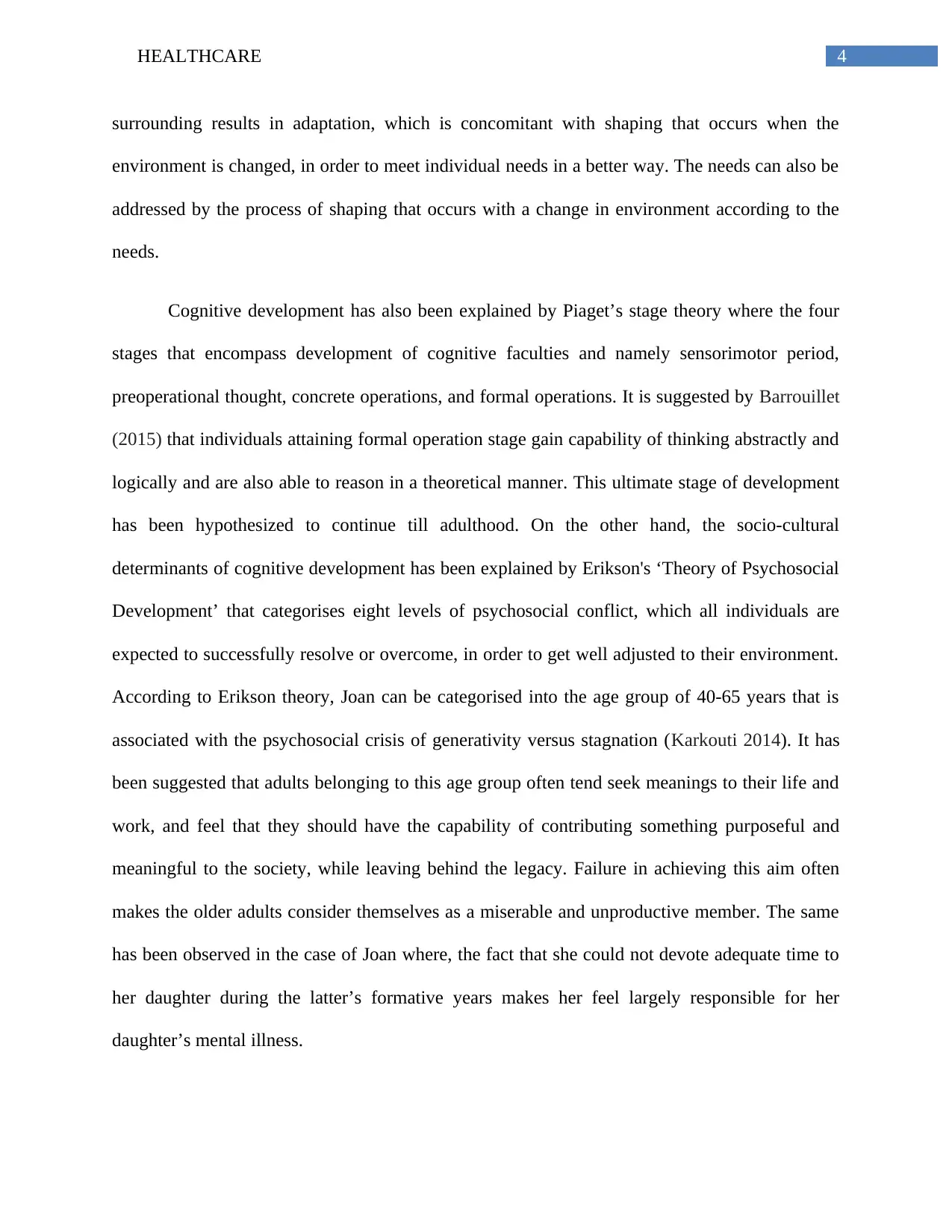
4HEALTHCARE
surrounding results in adaptation, which is concomitant with shaping that occurs when the
environment is changed, in order to meet individual needs in a better way. The needs can also be
addressed by the process of shaping that occurs with a change in environment according to the
needs.
Cognitive development has also been explained by Piaget’s stage theory where the four
stages that encompass development of cognitive faculties and namely sensorimotor period,
preoperational thought, concrete operations, and formal operations. It is suggested by Barrouillet
(2015) that individuals attaining formal operation stage gain capability of thinking abstractly and
logically and are also able to reason in a theoretical manner. This ultimate stage of development
has been hypothesized to continue till adulthood. On the other hand, the socio-cultural
determinants of cognitive development has been explained by Erikson's ‘Theory of Psychosocial
Development’ that categorises eight levels of psychosocial conflict, which all individuals are
expected to successfully resolve or overcome, in order to get well adjusted to their environment.
According to Erikson theory, Joan can be categorised into the age group of 40-65 years that is
associated with the psychosocial crisis of generativity versus stagnation (Karkouti 2014). It has
been suggested that adults belonging to this age group often tend seek meanings to their life and
work, and feel that they should have the capability of contributing something purposeful and
meaningful to the society, while leaving behind the legacy. Failure in achieving this aim often
makes the older adults consider themselves as a miserable and unproductive member. The same
has been observed in the case of Joan where, the fact that she could not devote adequate time to
her daughter during the latter’s formative years makes her feel largely responsible for her
daughter’s mental illness.
surrounding results in adaptation, which is concomitant with shaping that occurs when the
environment is changed, in order to meet individual needs in a better way. The needs can also be
addressed by the process of shaping that occurs with a change in environment according to the
needs.
Cognitive development has also been explained by Piaget’s stage theory where the four
stages that encompass development of cognitive faculties and namely sensorimotor period,
preoperational thought, concrete operations, and formal operations. It is suggested by Barrouillet
(2015) that individuals attaining formal operation stage gain capability of thinking abstractly and
logically and are also able to reason in a theoretical manner. This ultimate stage of development
has been hypothesized to continue till adulthood. On the other hand, the socio-cultural
determinants of cognitive development has been explained by Erikson's ‘Theory of Psychosocial
Development’ that categorises eight levels of psychosocial conflict, which all individuals are
expected to successfully resolve or overcome, in order to get well adjusted to their environment.
According to Erikson theory, Joan can be categorised into the age group of 40-65 years that is
associated with the psychosocial crisis of generativity versus stagnation (Karkouti 2014). It has
been suggested that adults belonging to this age group often tend seek meanings to their life and
work, and feel that they should have the capability of contributing something purposeful and
meaningful to the society, while leaving behind the legacy. Failure in achieving this aim often
makes the older adults consider themselves as a miserable and unproductive member. The same
has been observed in the case of Joan where, the fact that she could not devote adequate time to
her daughter during the latter’s formative years makes her feel largely responsible for her
daughter’s mental illness.
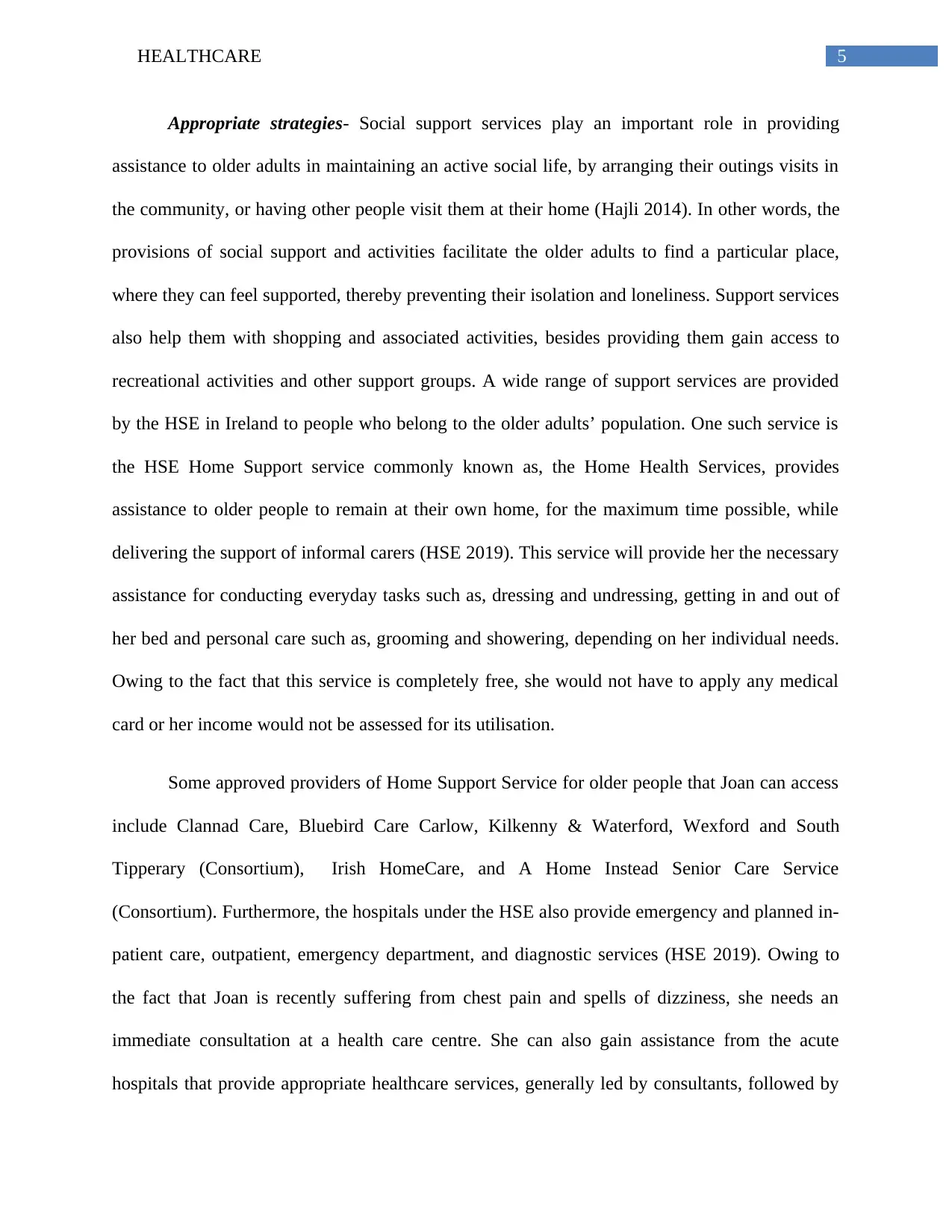
5HEALTHCARE
Appropriate strategies- Social support services play an important role in providing
assistance to older adults in maintaining an active social life, by arranging their outings visits in
the community, or having other people visit them at their home (Hajli 2014). In other words, the
provisions of social support and activities facilitate the older adults to find a particular place,
where they can feel supported, thereby preventing their isolation and loneliness. Support services
also help them with shopping and associated activities, besides providing them gain access to
recreational activities and other support groups. A wide range of support services are provided
by the HSE in Ireland to people who belong to the older adults’ population. One such service is
the HSE Home Support service commonly known as, the Home Health Services, provides
assistance to older people to remain at their own home, for the maximum time possible, while
delivering the support of informal carers (HSE 2019). This service will provide her the necessary
assistance for conducting everyday tasks such as, dressing and undressing, getting in and out of
her bed and personal care such as, grooming and showering, depending on her individual needs.
Owing to the fact that this service is completely free, she would not have to apply any medical
card or her income would not be assessed for its utilisation.
Some approved providers of Home Support Service for older people that Joan can access
include Clannad Care, Bluebird Care Carlow, Kilkenny & Waterford, Wexford and South
Tipperary (Consortium), Irish HomeCare, and A Home Instead Senior Care Service
(Consortium). Furthermore, the hospitals under the HSE also provide emergency and planned in-
patient care, outpatient, emergency department, and diagnostic services (HSE 2019). Owing to
the fact that Joan is recently suffering from chest pain and spells of dizziness, she needs an
immediate consultation at a health care centre. She can also gain assistance from the acute
hospitals that provide appropriate healthcare services, generally led by consultants, followed by
Appropriate strategies- Social support services play an important role in providing
assistance to older adults in maintaining an active social life, by arranging their outings visits in
the community, or having other people visit them at their home (Hajli 2014). In other words, the
provisions of social support and activities facilitate the older adults to find a particular place,
where they can feel supported, thereby preventing their isolation and loneliness. Support services
also help them with shopping and associated activities, besides providing them gain access to
recreational activities and other support groups. A wide range of support services are provided
by the HSE in Ireland to people who belong to the older adults’ population. One such service is
the HSE Home Support service commonly known as, the Home Health Services, provides
assistance to older people to remain at their own home, for the maximum time possible, while
delivering the support of informal carers (HSE 2019). This service will provide her the necessary
assistance for conducting everyday tasks such as, dressing and undressing, getting in and out of
her bed and personal care such as, grooming and showering, depending on her individual needs.
Owing to the fact that this service is completely free, she would not have to apply any medical
card or her income would not be assessed for its utilisation.
Some approved providers of Home Support Service for older people that Joan can access
include Clannad Care, Bluebird Care Carlow, Kilkenny & Waterford, Wexford and South
Tipperary (Consortium), Irish HomeCare, and A Home Instead Senior Care Service
(Consortium). Furthermore, the hospitals under the HSE also provide emergency and planned in-
patient care, outpatient, emergency department, and diagnostic services (HSE 2019). Owing to
the fact that Joan is recently suffering from chest pain and spells of dizziness, she needs an
immediate consultation at a health care centre. She can also gain assistance from the acute
hospitals that provide appropriate healthcare services, generally led by consultants, followed by
⊘ This is a preview!⊘
Do you want full access?
Subscribe today to unlock all pages.

Trusted by 1+ million students worldwide
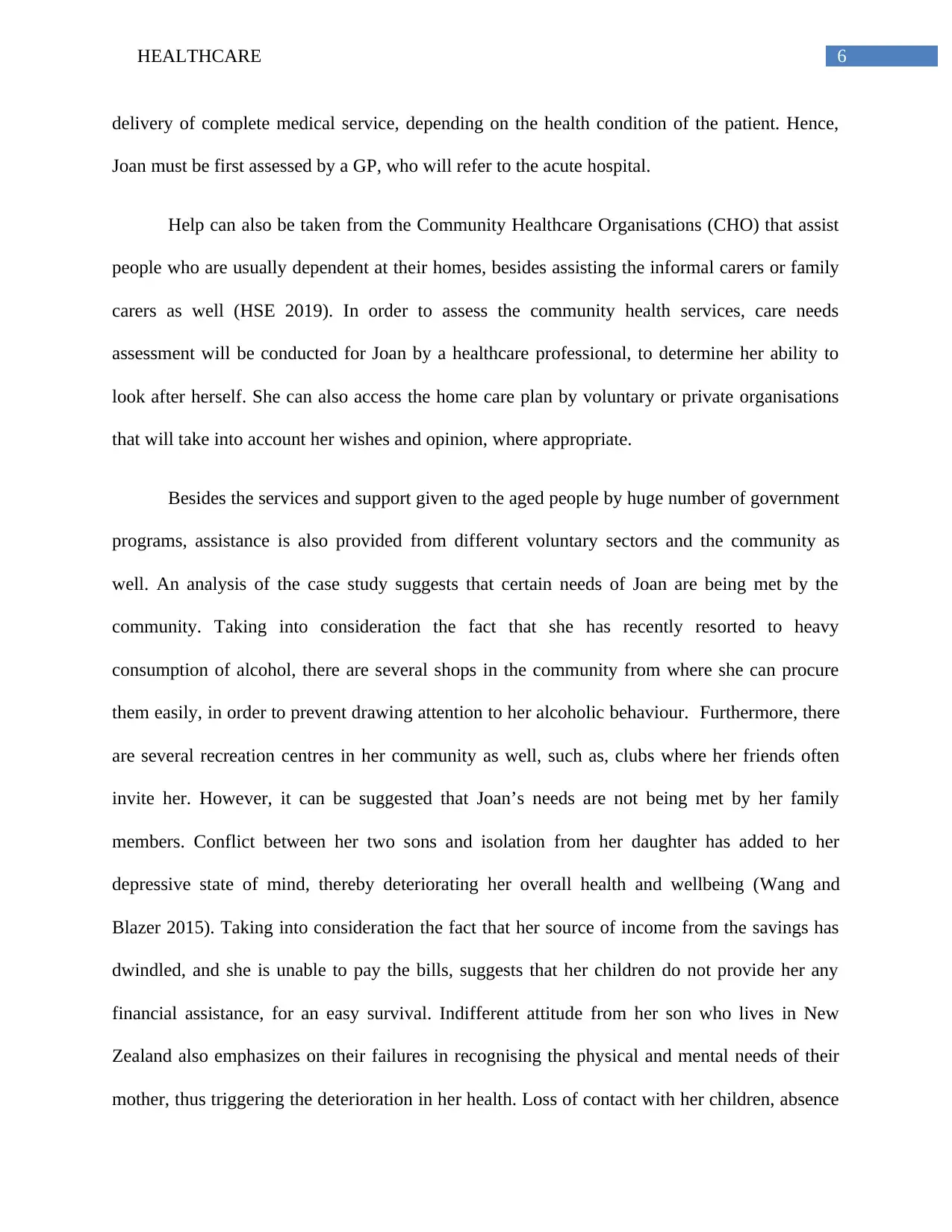
6HEALTHCARE
delivery of complete medical service, depending on the health condition of the patient. Hence,
Joan must be first assessed by a GP, who will refer to the acute hospital.
Help can also be taken from the Community Healthcare Organisations (CHO) that assist
people who are usually dependent at their homes, besides assisting the informal carers or family
carers as well (HSE 2019). In order to assess the community health services, care needs
assessment will be conducted for Joan by a healthcare professional, to determine her ability to
look after herself. She can also access the home care plan by voluntary or private organisations
that will take into account her wishes and opinion, where appropriate.
Besides the services and support given to the aged people by huge number of government
programs, assistance is also provided from different voluntary sectors and the community as
well. An analysis of the case study suggests that certain needs of Joan are being met by the
community. Taking into consideration the fact that she has recently resorted to heavy
consumption of alcohol, there are several shops in the community from where she can procure
them easily, in order to prevent drawing attention to her alcoholic behaviour. Furthermore, there
are several recreation centres in her community as well, such as, clubs where her friends often
invite her. However, it can be suggested that Joan’s needs are not being met by her family
members. Conflict between her two sons and isolation from her daughter has added to her
depressive state of mind, thereby deteriorating her overall health and wellbeing (Wang and
Blazer 2015). Taking into consideration the fact that her source of income from the savings has
dwindled, and she is unable to pay the bills, suggests that her children do not provide her any
financial assistance, for an easy survival. Indifferent attitude from her son who lives in New
Zealand also emphasizes on their failures in recognising the physical and mental needs of their
mother, thus triggering the deterioration in her health. Loss of contact with her children, absence
delivery of complete medical service, depending on the health condition of the patient. Hence,
Joan must be first assessed by a GP, who will refer to the acute hospital.
Help can also be taken from the Community Healthcare Organisations (CHO) that assist
people who are usually dependent at their homes, besides assisting the informal carers or family
carers as well (HSE 2019). In order to assess the community health services, care needs
assessment will be conducted for Joan by a healthcare professional, to determine her ability to
look after herself. She can also access the home care plan by voluntary or private organisations
that will take into account her wishes and opinion, where appropriate.
Besides the services and support given to the aged people by huge number of government
programs, assistance is also provided from different voluntary sectors and the community as
well. An analysis of the case study suggests that certain needs of Joan are being met by the
community. Taking into consideration the fact that she has recently resorted to heavy
consumption of alcohol, there are several shops in the community from where she can procure
them easily, in order to prevent drawing attention to her alcoholic behaviour. Furthermore, there
are several recreation centres in her community as well, such as, clubs where her friends often
invite her. However, it can be suggested that Joan’s needs are not being met by her family
members. Conflict between her two sons and isolation from her daughter has added to her
depressive state of mind, thereby deteriorating her overall health and wellbeing (Wang and
Blazer 2015). Taking into consideration the fact that her source of income from the savings has
dwindled, and she is unable to pay the bills, suggests that her children do not provide her any
financial assistance, for an easy survival. Indifferent attitude from her son who lives in New
Zealand also emphasizes on their failures in recognising the physical and mental needs of their
mother, thus triggering the deterioration in her health. Loss of contact with her children, absence
Paraphrase This Document
Need a fresh take? Get an instant paraphrase of this document with our AI Paraphraser
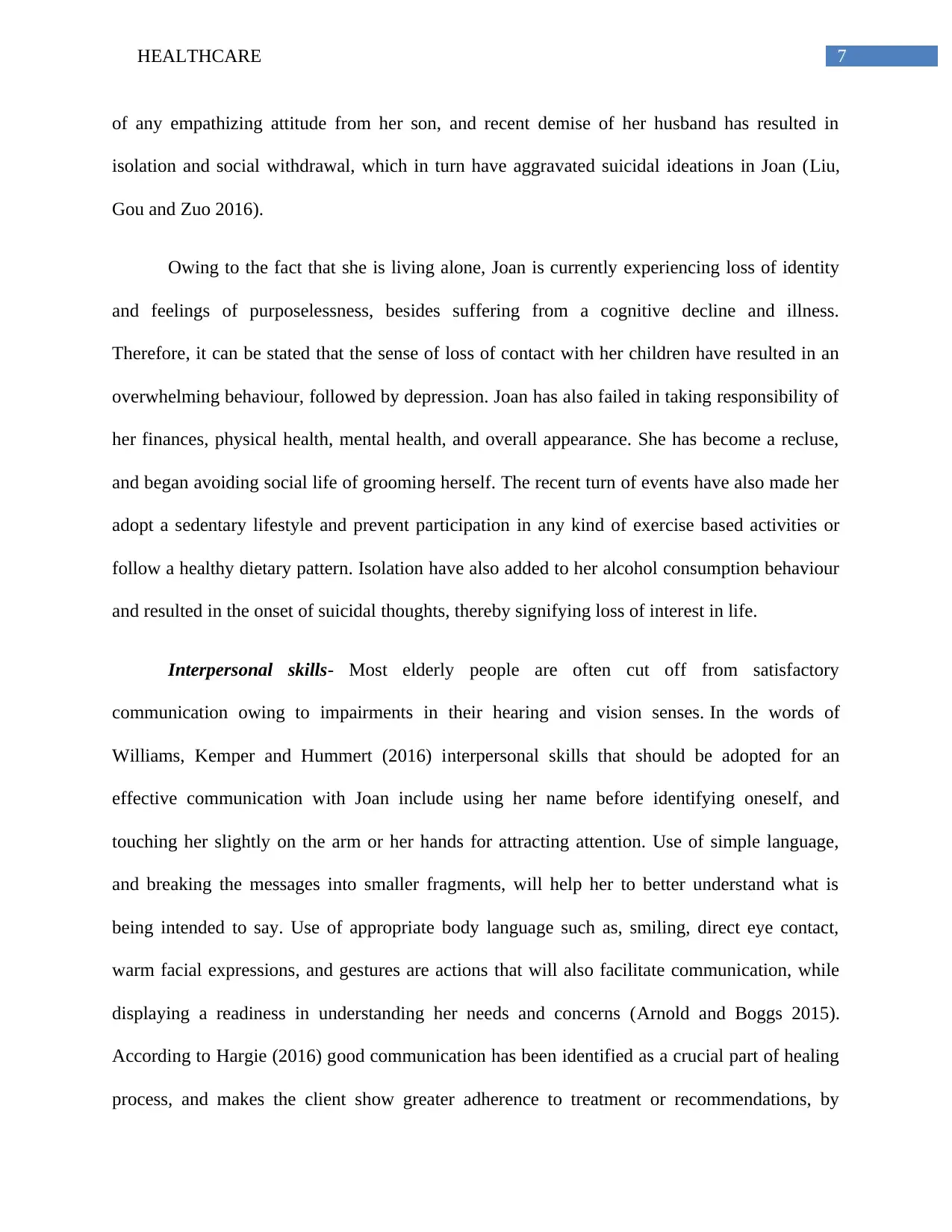
7HEALTHCARE
of any empathizing attitude from her son, and recent demise of her husband has resulted in
isolation and social withdrawal, which in turn have aggravated suicidal ideations in Joan (Liu,
Gou and Zuo 2016).
Owing to the fact that she is living alone, Joan is currently experiencing loss of identity
and feelings of purposelessness, besides suffering from a cognitive decline and illness.
Therefore, it can be stated that the sense of loss of contact with her children have resulted in an
overwhelming behaviour, followed by depression. Joan has also failed in taking responsibility of
her finances, physical health, mental health, and overall appearance. She has become a recluse,
and began avoiding social life of grooming herself. The recent turn of events have also made her
adopt a sedentary lifestyle and prevent participation in any kind of exercise based activities or
follow a healthy dietary pattern. Isolation have also added to her alcohol consumption behaviour
and resulted in the onset of suicidal thoughts, thereby signifying loss of interest in life.
Interpersonal skills- Most elderly people are often cut off from satisfactory
communication owing to impairments in their hearing and vision senses. In the words of
Williams, Kemper and Hummert (2016) interpersonal skills that should be adopted for an
effective communication with Joan include using her name before identifying oneself, and
touching her slightly on the arm or her hands for attracting attention. Use of simple language,
and breaking the messages into smaller fragments, will help her to better understand what is
being intended to say. Use of appropriate body language such as, smiling, direct eye contact,
warm facial expressions, and gestures are actions that will also facilitate communication, while
displaying a readiness in understanding her needs and concerns (Arnold and Boggs 2015).
According to Hargie (2016) good communication has been identified as a crucial part of healing
process, and makes the client show greater adherence to treatment or recommendations, by
of any empathizing attitude from her son, and recent demise of her husband has resulted in
isolation and social withdrawal, which in turn have aggravated suicidal ideations in Joan (Liu,
Gou and Zuo 2016).
Owing to the fact that she is living alone, Joan is currently experiencing loss of identity
and feelings of purposelessness, besides suffering from a cognitive decline and illness.
Therefore, it can be stated that the sense of loss of contact with her children have resulted in an
overwhelming behaviour, followed by depression. Joan has also failed in taking responsibility of
her finances, physical health, mental health, and overall appearance. She has become a recluse,
and began avoiding social life of grooming herself. The recent turn of events have also made her
adopt a sedentary lifestyle and prevent participation in any kind of exercise based activities or
follow a healthy dietary pattern. Isolation have also added to her alcohol consumption behaviour
and resulted in the onset of suicidal thoughts, thereby signifying loss of interest in life.
Interpersonal skills- Most elderly people are often cut off from satisfactory
communication owing to impairments in their hearing and vision senses. In the words of
Williams, Kemper and Hummert (2016) interpersonal skills that should be adopted for an
effective communication with Joan include using her name before identifying oneself, and
touching her slightly on the arm or her hands for attracting attention. Use of simple language,
and breaking the messages into smaller fragments, will help her to better understand what is
being intended to say. Use of appropriate body language such as, smiling, direct eye contact,
warm facial expressions, and gestures are actions that will also facilitate communication, while
displaying a readiness in understanding her needs and concerns (Arnold and Boggs 2015).
According to Hargie (2016) good communication has been identified as a crucial part of healing
process, and makes the client show greater adherence to treatment or recommendations, by
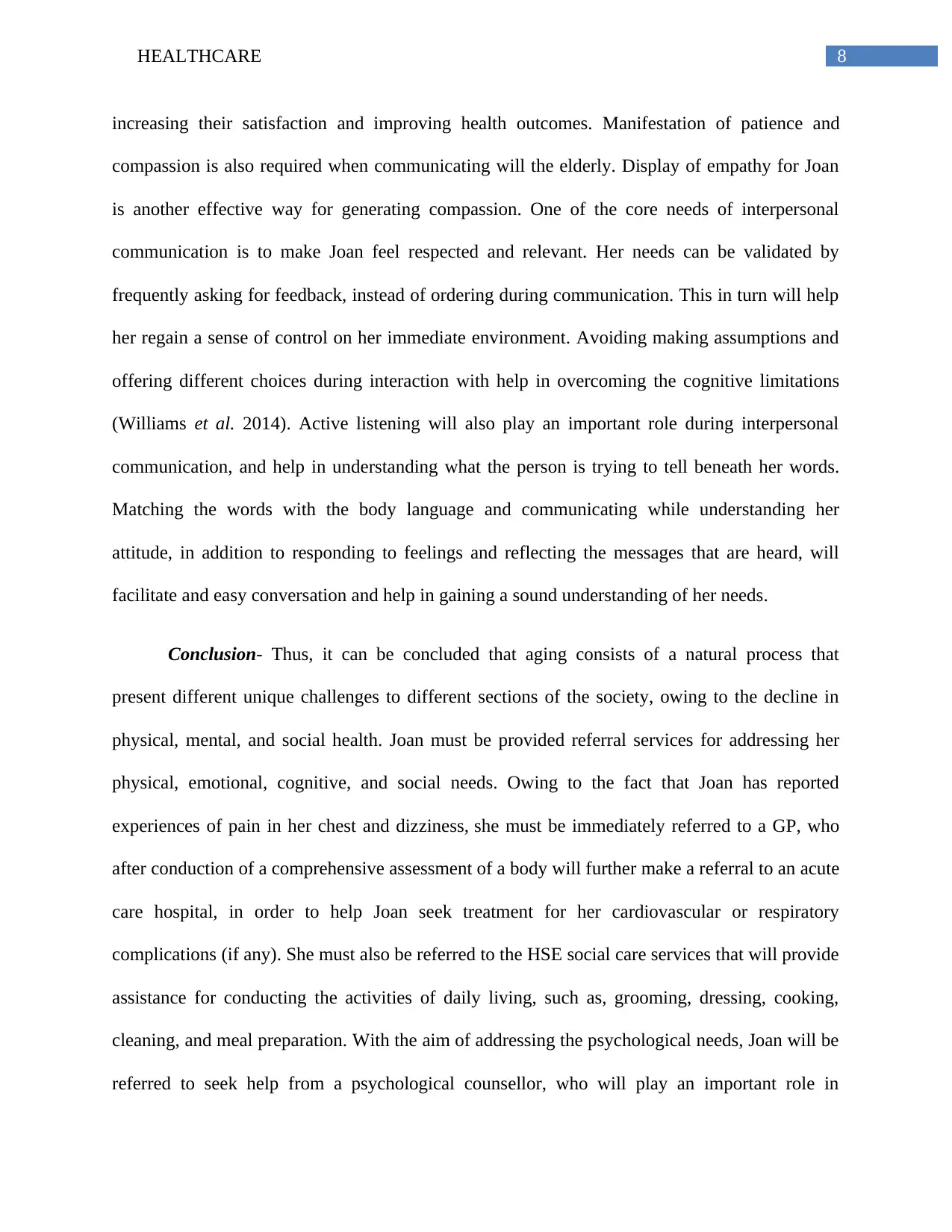
8HEALTHCARE
increasing their satisfaction and improving health outcomes. Manifestation of patience and
compassion is also required when communicating will the elderly. Display of empathy for Joan
is another effective way for generating compassion. One of the core needs of interpersonal
communication is to make Joan feel respected and relevant. Her needs can be validated by
frequently asking for feedback, instead of ordering during communication. This in turn will help
her regain a sense of control on her immediate environment. Avoiding making assumptions and
offering different choices during interaction with help in overcoming the cognitive limitations
(Williams et al. 2014). Active listening will also play an important role during interpersonal
communication, and help in understanding what the person is trying to tell beneath her words.
Matching the words with the body language and communicating while understanding her
attitude, in addition to responding to feelings and reflecting the messages that are heard, will
facilitate and easy conversation and help in gaining a sound understanding of her needs.
Conclusion- Thus, it can be concluded that aging consists of a natural process that
present different unique challenges to different sections of the society, owing to the decline in
physical, mental, and social health. Joan must be provided referral services for addressing her
physical, emotional, cognitive, and social needs. Owing to the fact that Joan has reported
experiences of pain in her chest and dizziness, she must be immediately referred to a GP, who
after conduction of a comprehensive assessment of a body will further make a referral to an acute
care hospital, in order to help Joan seek treatment for her cardiovascular or respiratory
complications (if any). She must also be referred to the HSE social care services that will provide
assistance for conducting the activities of daily living, such as, grooming, dressing, cooking,
cleaning, and meal preparation. With the aim of addressing the psychological needs, Joan will be
referred to seek help from a psychological counsellor, who will play an important role in
increasing their satisfaction and improving health outcomes. Manifestation of patience and
compassion is also required when communicating will the elderly. Display of empathy for Joan
is another effective way for generating compassion. One of the core needs of interpersonal
communication is to make Joan feel respected and relevant. Her needs can be validated by
frequently asking for feedback, instead of ordering during communication. This in turn will help
her regain a sense of control on her immediate environment. Avoiding making assumptions and
offering different choices during interaction with help in overcoming the cognitive limitations
(Williams et al. 2014). Active listening will also play an important role during interpersonal
communication, and help in understanding what the person is trying to tell beneath her words.
Matching the words with the body language and communicating while understanding her
attitude, in addition to responding to feelings and reflecting the messages that are heard, will
facilitate and easy conversation and help in gaining a sound understanding of her needs.
Conclusion- Thus, it can be concluded that aging consists of a natural process that
present different unique challenges to different sections of the society, owing to the decline in
physical, mental, and social health. Joan must be provided referral services for addressing her
physical, emotional, cognitive, and social needs. Owing to the fact that Joan has reported
experiences of pain in her chest and dizziness, she must be immediately referred to a GP, who
after conduction of a comprehensive assessment of a body will further make a referral to an acute
care hospital, in order to help Joan seek treatment for her cardiovascular or respiratory
complications (if any). She must also be referred to the HSE social care services that will provide
assistance for conducting the activities of daily living, such as, grooming, dressing, cooking,
cleaning, and meal preparation. With the aim of addressing the psychological needs, Joan will be
referred to seek help from a psychological counsellor, who will play an important role in
⊘ This is a preview!⊘
Do you want full access?
Subscribe today to unlock all pages.

Trusted by 1+ million students worldwide
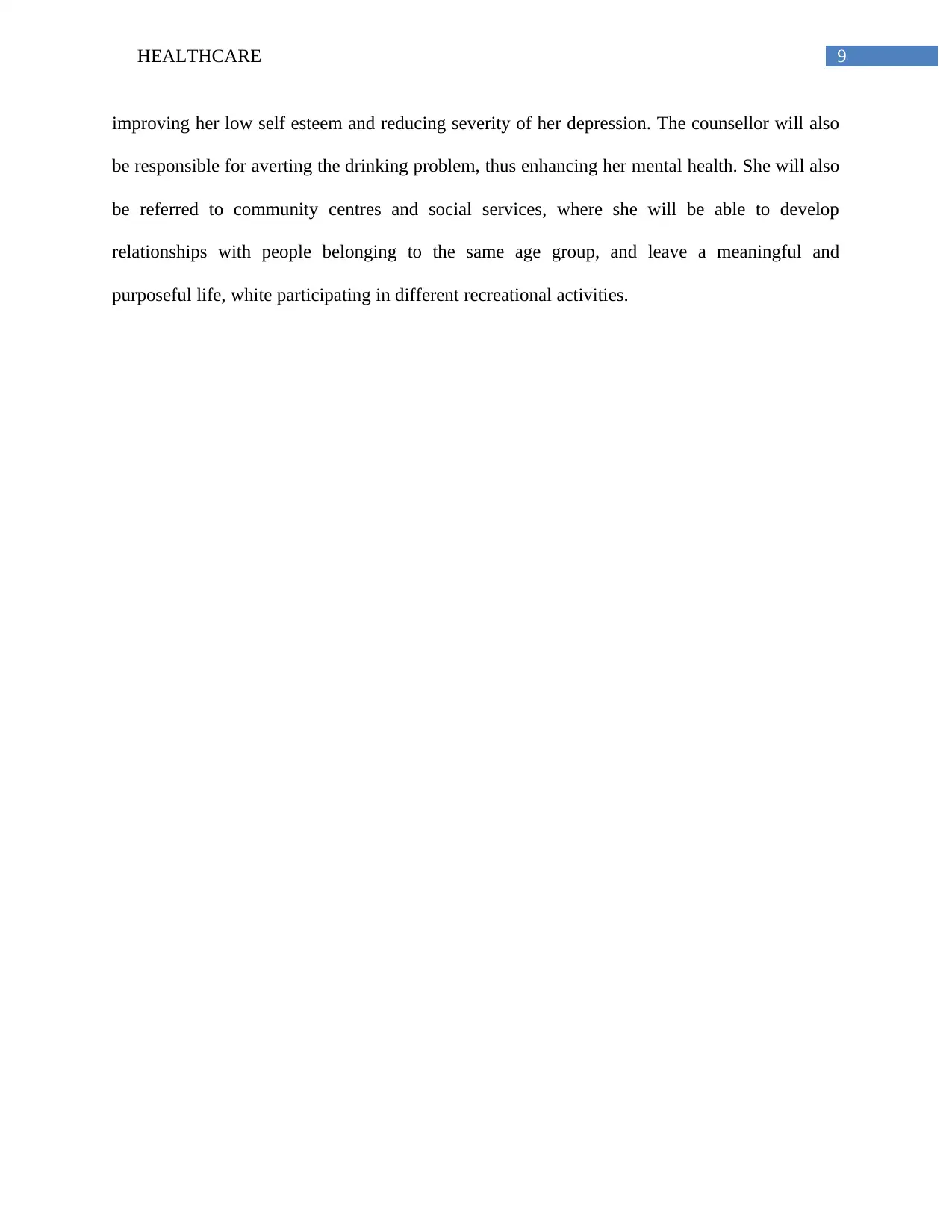
9HEALTHCARE
improving her low self esteem and reducing severity of her depression. The counsellor will also
be responsible for averting the drinking problem, thus enhancing her mental health. She will also
be referred to community centres and social services, where she will be able to develop
relationships with people belonging to the same age group, and leave a meaningful and
purposeful life, white participating in different recreational activities.
improving her low self esteem and reducing severity of her depression. The counsellor will also
be responsible for averting the drinking problem, thus enhancing her mental health. She will also
be referred to community centres and social services, where she will be able to develop
relationships with people belonging to the same age group, and leave a meaningful and
purposeful life, white participating in different recreational activities.
Paraphrase This Document
Need a fresh take? Get an instant paraphrase of this document with our AI Paraphraser
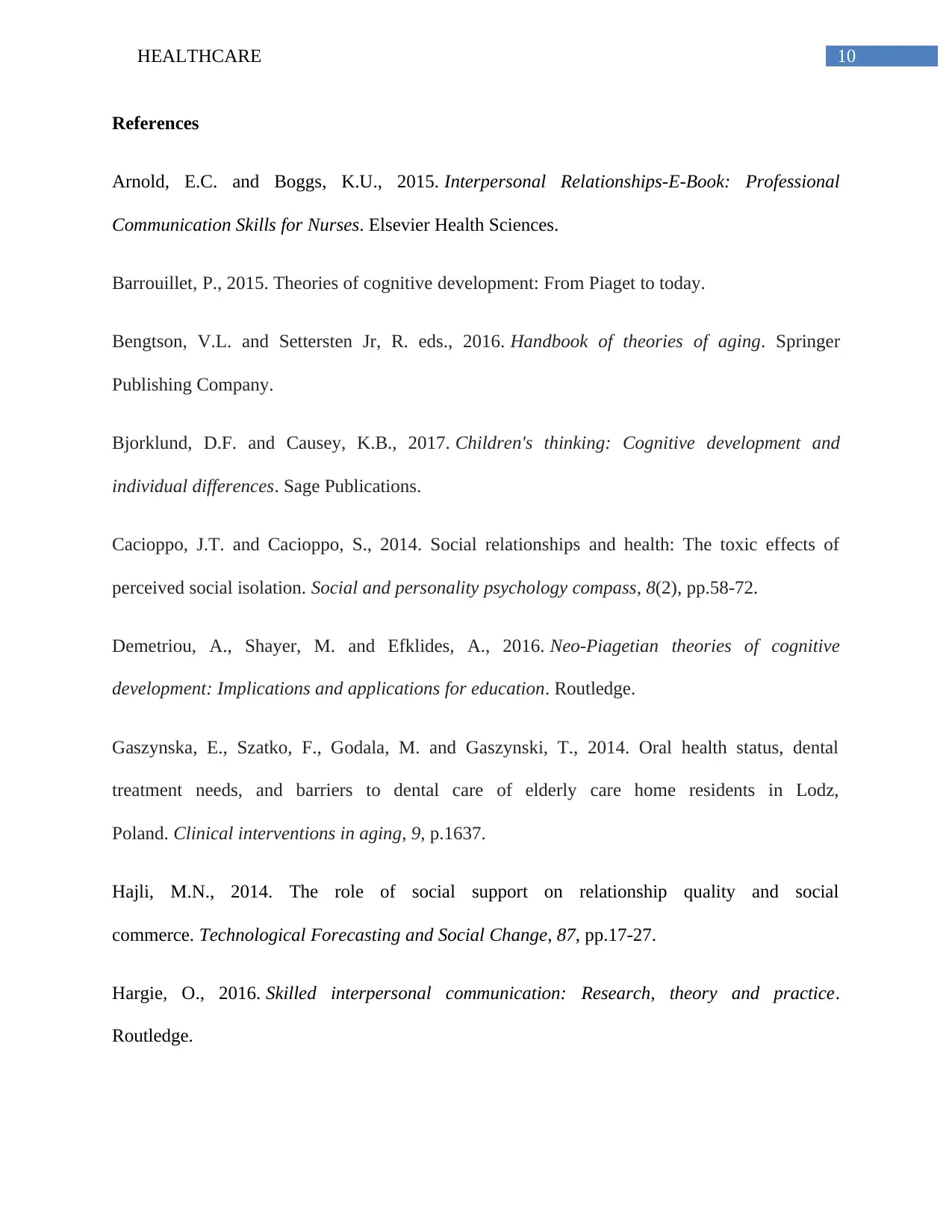
10HEALTHCARE
References
Arnold, E.C. and Boggs, K.U., 2015. Interpersonal Relationships-E-Book: Professional
Communication Skills for Nurses. Elsevier Health Sciences.
Barrouillet, P., 2015. Theories of cognitive development: From Piaget to today.
Bengtson, V.L. and Settersten Jr, R. eds., 2016. Handbook of theories of aging. Springer
Publishing Company.
Bjorklund, D.F. and Causey, K.B., 2017. Children's thinking: Cognitive development and
individual differences. Sage Publications.
Cacioppo, J.T. and Cacioppo, S., 2014. Social relationships and health: The toxic effects of
perceived social isolation. Social and personality psychology compass, 8(2), pp.58-72.
Demetriou, A., Shayer, M. and Efklides, A., 2016. Neo-Piagetian theories of cognitive
development: Implications and applications for education. Routledge.
Gaszynska, E., Szatko, F., Godala, M. and Gaszynski, T., 2014. Oral health status, dental
treatment needs, and barriers to dental care of elderly care home residents in Lodz,
Poland. Clinical interventions in aging, 9, p.1637.
Hajli, M.N., 2014. The role of social support on relationship quality and social
commerce. Technological Forecasting and Social Change, 87, pp.17-27.
Hargie, O., 2016. Skilled interpersonal communication: Research, theory and practice.
Routledge.
References
Arnold, E.C. and Boggs, K.U., 2015. Interpersonal Relationships-E-Book: Professional
Communication Skills for Nurses. Elsevier Health Sciences.
Barrouillet, P., 2015. Theories of cognitive development: From Piaget to today.
Bengtson, V.L. and Settersten Jr, R. eds., 2016. Handbook of theories of aging. Springer
Publishing Company.
Bjorklund, D.F. and Causey, K.B., 2017. Children's thinking: Cognitive development and
individual differences. Sage Publications.
Cacioppo, J.T. and Cacioppo, S., 2014. Social relationships and health: The toxic effects of
perceived social isolation. Social and personality psychology compass, 8(2), pp.58-72.
Demetriou, A., Shayer, M. and Efklides, A., 2016. Neo-Piagetian theories of cognitive
development: Implications and applications for education. Routledge.
Gaszynska, E., Szatko, F., Godala, M. and Gaszynski, T., 2014. Oral health status, dental
treatment needs, and barriers to dental care of elderly care home residents in Lodz,
Poland. Clinical interventions in aging, 9, p.1637.
Hajli, M.N., 2014. The role of social support on relationship quality and social
commerce. Technological Forecasting and Social Change, 87, pp.17-27.
Hargie, O., 2016. Skilled interpersonal communication: Research, theory and practice.
Routledge.
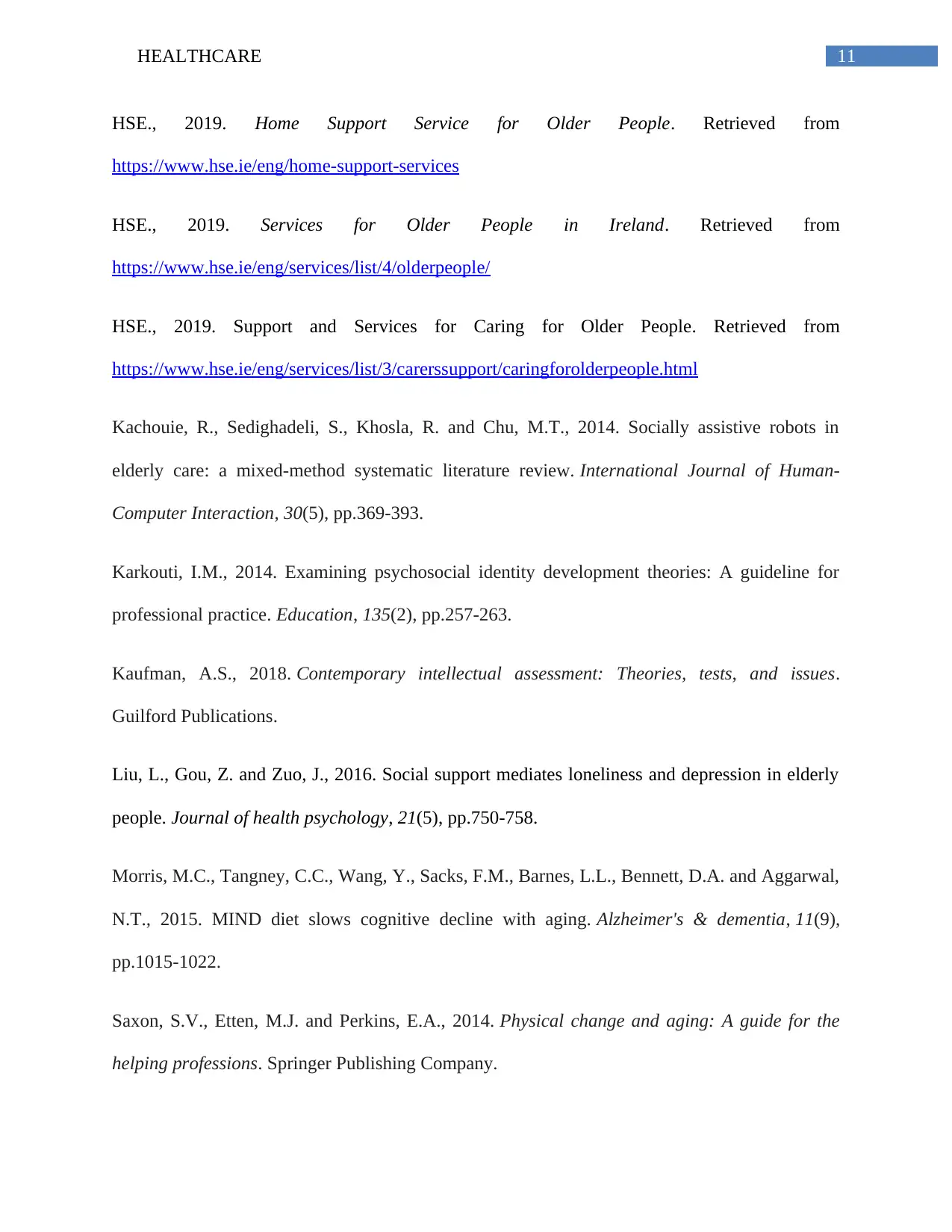
11HEALTHCARE
HSE., 2019. Home Support Service for Older People. Retrieved from
https://www.hse.ie/eng/home-support-services
HSE., 2019. Services for Older People in Ireland. Retrieved from
https://www.hse.ie/eng/services/list/4/olderpeople/
HSE., 2019. Support and Services for Caring for Older People. Retrieved from
https://www.hse.ie/eng/services/list/3/carerssupport/caringforolderpeople.html
Kachouie, R., Sedighadeli, S., Khosla, R. and Chu, M.T., 2014. Socially assistive robots in
elderly care: a mixed-method systematic literature review. International Journal of Human-
Computer Interaction, 30(5), pp.369-393.
Karkouti, I.M., 2014. Examining psychosocial identity development theories: A guideline for
professional practice. Education, 135(2), pp.257-263.
Kaufman, A.S., 2018. Contemporary intellectual assessment: Theories, tests, and issues.
Guilford Publications.
Liu, L., Gou, Z. and Zuo, J., 2016. Social support mediates loneliness and depression in elderly
people. Journal of health psychology, 21(5), pp.750-758.
Morris, M.C., Tangney, C.C., Wang, Y., Sacks, F.M., Barnes, L.L., Bennett, D.A. and Aggarwal,
N.T., 2015. MIND diet slows cognitive decline with aging. Alzheimer's & dementia, 11(9),
pp.1015-1022.
Saxon, S.V., Etten, M.J. and Perkins, E.A., 2014. Physical change and aging: A guide for the
helping professions. Springer Publishing Company.
HSE., 2019. Home Support Service for Older People. Retrieved from
https://www.hse.ie/eng/home-support-services
HSE., 2019. Services for Older People in Ireland. Retrieved from
https://www.hse.ie/eng/services/list/4/olderpeople/
HSE., 2019. Support and Services for Caring for Older People. Retrieved from
https://www.hse.ie/eng/services/list/3/carerssupport/caringforolderpeople.html
Kachouie, R., Sedighadeli, S., Khosla, R. and Chu, M.T., 2014. Socially assistive robots in
elderly care: a mixed-method systematic literature review. International Journal of Human-
Computer Interaction, 30(5), pp.369-393.
Karkouti, I.M., 2014. Examining psychosocial identity development theories: A guideline for
professional practice. Education, 135(2), pp.257-263.
Kaufman, A.S., 2018. Contemporary intellectual assessment: Theories, tests, and issues.
Guilford Publications.
Liu, L., Gou, Z. and Zuo, J., 2016. Social support mediates loneliness and depression in elderly
people. Journal of health psychology, 21(5), pp.750-758.
Morris, M.C., Tangney, C.C., Wang, Y., Sacks, F.M., Barnes, L.L., Bennett, D.A. and Aggarwal,
N.T., 2015. MIND diet slows cognitive decline with aging. Alzheimer's & dementia, 11(9),
pp.1015-1022.
Saxon, S.V., Etten, M.J. and Perkins, E.A., 2014. Physical change and aging: A guide for the
helping professions. Springer Publishing Company.
⊘ This is a preview!⊘
Do you want full access?
Subscribe today to unlock all pages.

Trusted by 1+ million students worldwide
1 out of 13
Related Documents
Your All-in-One AI-Powered Toolkit for Academic Success.
+13062052269
info@desklib.com
Available 24*7 on WhatsApp / Email
![[object Object]](/_next/static/media/star-bottom.7253800d.svg)
Unlock your academic potential
Copyright © 2020–2025 A2Z Services. All Rights Reserved. Developed and managed by ZUCOL.





